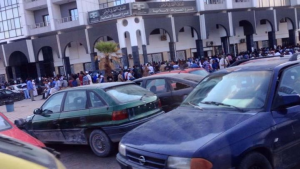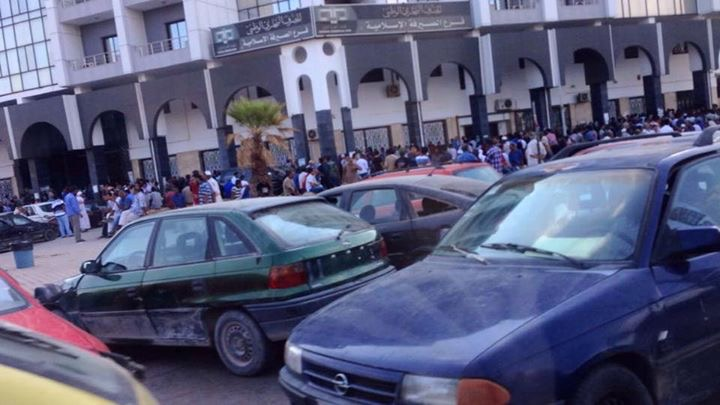By Ibrahim Drissi.

Benghazi, 10 September 2016:
On the eve of the Eid-al-Adha (feast of sacrifice) holidays, the residents of Benghazi – and the eastern region on the whole – struggle on with the same recurring scenes and scenarios.
Political instability, difficult living conditions, queues at banks for scarce cash, shortages in supplies and services, inflation, high prices, and sky-high black market foreign exchange rates – present a constantly reoccurring and challenging reality that Libyans are hostage to.
These are the views of Benghazi residents, Libya’s second largest city and cradle of the 17th February 2011 revolution that had led to the overthrow of the Qaddafi regime. Not that Benghazi is any worse than the rest of the country as the same challenges are faced nationwide.
With the onset of Eid al-Adha celebrations, many Libyans in the city, like many across the country, live in a state of internal displacement and depression, struggling to overcome or survive everyday obstacles and difficulties, residents report.
Like the west of the country, the authorities say that liquidity has been delivered to banks. However, the reality, like in the west, is that banks are imposing withdrawal limits. On the eve of Eid, Benghazi’s banks have been suffering the same overcrowding for a week, with withdrawal limits set at between LD 500-1,000 – nearly double the average Tripoli rate.
‘’What the country is going through is very bad especially in light of the political divisions. The officials in East and West are ignoring the suffering of Libyan citizen and ignoring the poor economic situation that the Libyan citizen is paying the price for’’, *Fatma Saad said. The unmarried 32-year-old teacher lives with her mum, who lives off LD 400 monsocial security after the passing away of Fatma’s dad.
Saleh Ibrahim, father of five, said he couldn’t withdraw his money from his bank as a result of overcrowding. He said he stood in line every day for a week to no avail forcing him to stay overnight in front of the Bank.
Father of three children, Ahmed Ali, said that for four months he has been unable to withdraw his salary due to lack of liquidity and then due to overcrowding when there is liquidity. ‘‘Only yesterday I managed to withdraw 1,000 dinars after 4 months. I was afraid I will not be able to buy a sheep (for the Eid sacrifice) and that my children would not be able to celebrate the Eid like other children’’.
Sheep trader Jamal Saad, claimed that his profit was only LD 10 in every one of the sacrifice sheep. He said that the sheep traders tried to make sheep prices affordable to citizens. He put the reason for the high price of sheep to expensive animal feed which he said used to cost 95 dinars where previously it had cost no more than 30 dinars.
To help with the comparatively large cost of sacrifice sheep, a local charity cooperative distributed free sheep to many internally displaced whilst the Special Forces distributed 960 free sheep to its martyr’s families.
Meanwhile, importers of (cheaper) foreign sheep had attempted to set affordable prices at between LD 250-350 per sheep. Yousef Shaban, a sheep trader who participated in importing sheep, said ‘‘in order to alleviate the burden on liquidity we reached an agreement with Wahda and Commerce and Development banks to accept payment by guaranteed cheques.
Nearly 30,000 sheep were imported ‘‘in the hope of bringing joy to children and reducing the suffering of people in these difficult times’’, Shaban added.
*The names of Benghazi residents have been changed for safety reasons.









